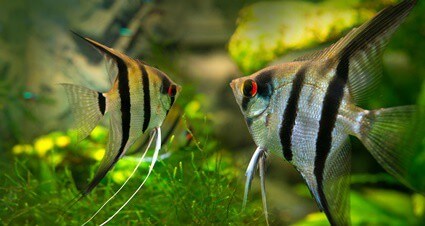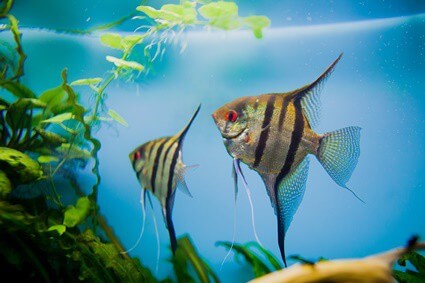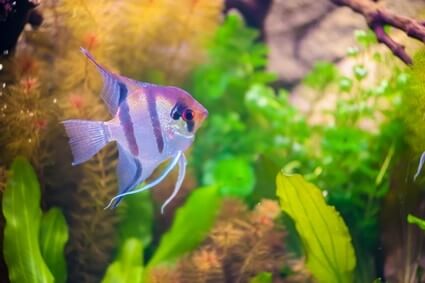Angelfish have beautiful stripes and colors. When they lose scales, it’s plain to see. Angelfish don’t naturally lose or shed scales, so you can determine when fish are in poor health.
Angelfish lose their scales due to injuries, parasites, infections, and ‘scale shedding disease.’
Fish can hurt themselves by swimming into aquarium walls, making contact with ornaments, attacking each other during mating season, or living in an overcrowded tank.
Some reasons for scale loss in angelfish may result in death if left untreated.
Even parasites and infections that don’t directly cause scale loss can leave fish bare because they rub against objects to relieve irritation. Consequently, scales may be damaged and dislodged.
Do Angelfish Shed Their Skin?
Angelfish have skin coated in small scales.
Because creatures like snakes and lizards shed their skin, many owners believe their angelfish do, but this is a misconception. A healthy angelfish in an appropriate tank will never shed scales.
The scales of freshwater and marine angelfish grow and should remain for life. If your fish have begun shedding their scales, especially their skin, this is dangerous.
It indicates an underlying problem in the tank or the health of the fish. Getting to the root of the problem will take some analysis, so you may need to quarantine the afflicted fish while seeking an answer.
Why Are My Angelfish’s Scales Falling Off?
Angelfish aren’t overly hardy fish. When exposed to illness and stress, they change color slightly and lose pigment in their stripes. Losing scales is an extreme version of this process.
If your fish is suddenly losing scales, look for these signs:
Injury
Does your fish look fine one day but has lost multiple scales the next day? Then, your angelfish may have sustained an injury.
Running Into Objects
Angelfish are active and can pull off bursts of speed when prompted. In the wild, that isn’t a problem as it helps them avoid predators and chase down prey.
In an aquarium, there are items that fish can swim into. At full speed, this can cause severe damage.
The fish may do one or more of the following:
- Crash into one of the walls.
- Scrape itself across a decoration.
- Clatter around in the rocks or sediment in the tank.
- Run into a filter or other tank-cleaning equipment.
If you notice your fish is suddenly more active, it may be the start of the breeding season.
Angelfish grow more active during the mating period or when reaching maturity. As the fish courts its chosen mate, it may swim around the tank at higher speeds to claim territory or prove its finesse.
Since many freshwater angelfish species mate for life, this may only occur once in the fish’s lifespan. The Brazilian Journal of Biology found that some angelfish species will seek a new mate eventually.

Fighting
Fighting can happen throughout mating season. Angelfish impress their mates by claiming territory and proving themselves to be the strongest suitor, resulting in conflicts between male angelfish.
These duels can get heavy-handed, causing the fish to:
- Chase each other into walls.
- Bite at each other’s scales.
- Slam into one another.
The fights usually end when one angelfish flees and hides from the other. If they lack hiding spaces, such as decorations or plants, the conflict may continue, which is where scale loss occurs.
These fights may result from overcrowding because angelfish need private areas and space. If different species or other angelfish move in on these spaces, the crowded angelfish will lash out.
If it’s particularly stressed from water conditions, temperatures, or overcrowding, it may even eat other fish. As the prey defends itself, your angelfish could get injured.
Parasites
Some of the parasites that target angelfish include:
- Anchor worms.
- Gill flukes.
- Planarians.
Despite what the name implies, anchor worms are tiny crustaceans that embed themselves into the scales and skin of the fish.
The fish may dislodge its scales to get rid of the annoyance. This remains true for many parasites that infect aquarium fish, no matter their species.
How To Spot Parasites In Angelfish
If you think your fish is struggling with parasites, document it.
You may notice parasites:
- Clinging to the fish.
- Sticking out of the fish’s scales.
- Causing damage to the fish’s body.
Signs of damage will include lost scales, but also:
- Increased appetite.
- Dimmer colors.
- Lethargic swimming.
- Sores or pocket marks on the fish.
- Frail or damaged scales and fins.
Take a photograph of these symptoms, and get a water sample. When you take this evidence to a vet, they can identify the parasite and provide treatment.
Infection
Fish can die quickly from infection and may struggle to recover if they survive.
Also, one infection can quickly escalate into a full-blown problem for all your fish because all your aquarium fish share the same water.
There are many types of infection in fish and causes, and some will result in death if left untreated.
Your fish may have an infection if:
- There are bare patches along the fish.
- Where the scales have been shed, there are peeling strips of skin.
- Scales and skin come off together in strips.
- The scales stick up or poke out away from the fish.
This can indicate that your fish isn’t only infected, but that infection is progressing rapidly.
Infections can be triggered by:
- An imbalance of bacteria in the aquarium.
- Introducing new fish or plants.
- Failing health of the fish.
- Not performing regular tank maintenance is causing harmful bacteria colonies.
Even if an infection doesn’t directly cause the scales to fall out, the fish may rub itself against objects in the tank to remove the irritation. However, it may also tear off the scales.
Scale Shedding Disease
The most common reason for scale loss is ‘scale shedding disease.’
The scales will stick up from the fish’s skin, almost like a hedgehog or pinecone. This is due to cysts forming underneath the scales, forcing them to protrude.
Eventually, the disturbed scales will fall off.
How Can I Stop My Angelfish From Losing Scales?
If you’re faced with these issues, let’s explore the preliminary steps you can take:
Fighting And Overcrowding
If your fish are battling or swimming fast due to the commencement of the mating season, both situations can result in accidental injuries.
To prevent issues from occurring, consider:
More Plants
Too many decorations can create many sharp objects for your fish to run into. However, having no decorations gives the angelfish nowhere to hide.
The best option is to make your aquarium plant-rich rather than ornament-heavy. Keeping some ornaments in the tank is okay, but ensure they lack sharp edges to minimize fin-tearing events.
If you choose plants, they must be thick and grow well in your tank’s size. The fuller they are, the more places your angelfish can hide when necessary.
Larger Tank
The tank must be large enough to accommodate all angelfish, as aggression isn’t nearly so pronounced when the angelfish are provided with a large enough tank.
Switch Tank Mates
Your fish may be more territorial and aggressive with certain fish species. Consider the population of your tank and see if any particular fish are spurring your angelfish into battle.
If you have too many male angelfish, they may remain in conflict after the mating season. They’ll try to establish a social hierarchy, and this process can be aggressive.

Place The Tank Correctly
Angelfish are ambush predators and don’t startle easily. However, constant exposure to sudden movements or a lack of shelter will be stressful.
A stressed angelfish can become unhealthy, causing loss of scales. Consider the following factors:
- Where the aquarium is placed.
- Things that interact with it.
- If the environment within the tank is suited to the needs and behaviors of angelfish.
Parasites
If you don’t notice them early, parasites can be difficult to remove. Not all of them will attach themselves to fish, but it’s still unpleasant to have an infested aquarium.
Treating parasites depends on the type of parasite. Some can be culled with aquarium salt and consistent water changes, while others may need medication added to the water or complete tank sterilization.
Keeping parasites out of your tank relies on the following:
- Adding treated water to the aquarium.
- Quarantining new fish and plants before adding them.
- Keeping the fish healthy.
Even fish purchased from a reputable supplier should be quarantined.
Infection
At the first sign of infection, remove any contaminated fish from the tank and quarantine them in a separate aquarium.
This limits exposure to the other fish, and it’s suitable for the infected fish, as it keeps the stronger ones from bullying the weak ones. Depending on the type of infection (yeast, bacterial, or fungal), you’ll need to source the appropriate medication.
The tank may need to be sterilized, too. Depending on the type of infection and its spread, this could involve a full decontamination or treatment with aquarium salt.
It’s good practice to quarantine new fish for at least 2 weeks before placing them in a community tank. If you notice a wound on your fish, you can treat the tank with aquarium salt to aid the healing process and prevent the infection from forming.
According to the Veterinary Clinics Exotic Animal Practice, fungal infections are a byproduct of greater issues. So, regular tank maintenance is the best way to keep infections from forming.
Do Angelfish Scales Grow Back?
Angelfish can regrow their scales if the:
- The root issue is corrected.
- Fish are given enough food and protection to recover.
- The environment is improved or kept stable, so new problems don’t occur.
If the situation is under control, your fish will recover its scales in a couple of weeks.
More severe injuries or illnesses may cause your fish to heal more slowly. Here, it may take months to get its scales back. Of course, there are cases where the scales never come back.
This happens when there are:
Repeat Issues
What if you don’t solve the infection, or your fish continues to get in fights?
Then, the regrown scales will get ripped off again. If this happens several times, the angelfish may lose its ability to regrow scales. The underlying skin will be damaged.
Scarring
If the fish had a nasty fight or infection, there might be scarring, and this usually happens if the skin beneath the scales is heavily damaged. In this case, the angelfish will never regrow scales in that area.
This not only subtracts from its aesthetic beauty but can leave the fish vulnerable. After all, scales are necessary to protect them from bacteria, external damage, and environmental changes.
Apply the treatment. If your angelfish is fighting, ill, or infested with parasites, it may lose some of its scales. When this happens, you need to make adjustments without delay.








